|
Beyond Edinburgh, perhaps the best known town in
Scotland is Stirling, which hordes of pilgrims pass in the round trip of a
single day through the famous Trossachs District, displaying such a finely
mixed assortment of Scottish scenery, lochs, woods, and mountains
that like giants stand
To sentinel enchanted land.
Stirling, on the edge of the Highlands, played a
central part, even long after the Scottish kings had been drawn down to
the rich fields of Lothian and the Merse. From the rock on which the
Castle stands, only less boldly than that of Edinburgh, one looks over the
Links of Forth, making such sinuous meanderings upon its Carse, and across
to the Ochil Hills that border Fife ; then from another point of view
appear the rugged Bens among which Roderick Dhu had his strongholds. Not
fair prospects alone are tourists' attraction to Stirling. The palace of
James V., the houses of great nobles like Argyll and Mar, the execution
place of the last Roman Catholic Archbishop of Scotland, the memorials of
Protestant martyrs, the proud monuments of Bruce and Wallace, the ruins of
Cambuskenneth Abbey, with its royal sepulchre, all show this region the
heart of mediaeval Scottish history. While Edinburgh grew to be recognised
as the capital, Stirling Castle was the birthplace and the favourite
residence of several among the James Stuarts that came to such an uneasy
crown in boyhood ; sometimes it was their prison or their school of
sanguinary politics, when possession of the royal person counted as ace in
the game played by truculently treacherous nobles. It has the distinction
of being the last British castle to stand a siege, raised in 1746 by the
Duke of Cumberland, when, as his panegyrical historian says, "in the Space
of one single Week, his Royal Highness quitted the Court of the King his
Father, put himself at the head of his Troops in Scotland, and saw
the Enemy flying with Precipitation before him, so that it may be said
that his progress was like Lightning, the rebels fled at the flash,
fearing the Thunder that was to follow." Its ramparts look down on
Scotland's dearest battlefields, that where Wallace ensnared the invader
at the Old Bridge, and that of Bannockburn, when Bruce turned the flower
of English chivalry to dust and to gold, for, as the latest historian
says, "it rained ransoms" in Scotland after this profitable victory.
One may speculate what might have been the fate of the
United Kingdom had Bannockburn ended otherwise. Would the barons of the
north have found a master in Edward III.? Would the Plantagenets, with
Scotland to back them, have made good their conquest of France? Would the
stern reformers across the Tweed have suffered the Tudors to shape and
re-shape the Church as they

Stirling Castle from The King's Knot
did? Would the Scottish adventurers who once kept their
swords sharp as soldiers of fortune all over Europe, have sooner found a
career in forcing themselves to the front of British society? This much
seems clear, that there has been a woeful waste of ill-blood before a
union that came about after all, in the way of peace. Yet are we so made
that the most philosophic Scot, even fresh from a course of John Stuart
Mill or Herbert Spencer, cannot look down upon these battle-grounds
without a throb in his heart. It was Bannockburn that made us a nation,
poor but free to be ourselves. Then, since we did not always come off so
well in our battles with England, naturally we make much of the points won
in a doubtful game. When I was at school there came among us perfervid
young Scots an English boy, before whom, we agreed, it would be courteous
and kind not to mention Bannockburn. Yet in the end some itching tongue
let slip this moving name, but without ruffling our new comrade's pride.
It turned out that he complacently took Bannockburn to have been an
English victory ; at all events, one more or less made no great matter to
his thinking. Englishmen take their own national trophies so much for
granted, that they are apt to forget the susceptibilities of other
peoples. Such a one was rebuked by a coachman driving him over the field
of Bannockburn. "You Scotch are always boasting of your country, but when
you come south you are in no hurry to get back again." With thumb pointed
to the ground, the Scot made stern answer: "There was thirty thousand o'
you cam north, and no mahny o' them went back again!" There are other
battlefields about Stirling, of which Scotland has no such title to be
proud, as that of Falkirk, where Wallace brought his renown to a falling
market and Prince Charles Edward had but half a victory; that of
Sauchieburn, where James III. was foully slain; and that of Sheriffmuir,
the Culloden of 1715.
Let us hang a little longer upon the Castle ramparts to
take a bird's-eye view of the stirring story that often came to centre
round this rock. Over Highland mountain and Lowland strath the clouds lift
away, giving here and there a doubtful glimpse of Scots from Ireland,
Celts from who knows how far, Britons of Strathclyde, and dim Picts of the
east, each such a wild race as "slew the slayer and shall himself be
slain," among whom intrude Roman legions and Norse pirates, the former
falling back from their thistly conquest, the latter settling themselves
firmly on the coasts. Out of this welter, as out of the Heptarchy in the
south, emerges a more or less dominant kingdom seated on the Tay. While
the power of the Scots seems to have gone under, their name floats at the
top, so as to christen the new nation, that on the south side, from the
wide bounds of Northumbria, takes in a stable element destined to be the
cement of the whole.
The next act shows the struggle of a partly Saxonised
people against the Anglo-Norman kings and their claims to feudal
superiority. The curtain rises on a sensational melodrama of confused
alarms and excursions, where the ill-drilled Celtic supernumeraries at the
back of the stage often fall to fighting like wild cats among themselves,
while the mail-clad barons prance now on one side and now on the other, as
the scenes shift about a border-line almost rubbed out by the crossing and
recrossing of
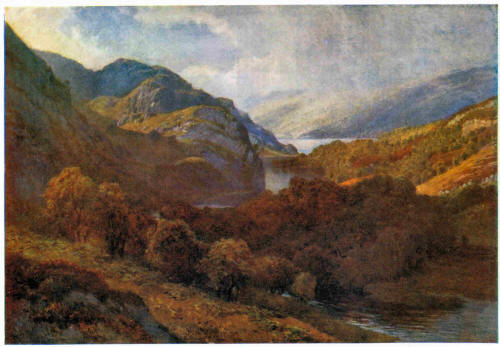
The Outflow of Loch Katrine, Perthshire
armies. The heroes of the most thrilling tableaux are
Wallace and Bruce ; and the loudest applause hails the culminating blaze
of lime-light on Bannockburn.
The wars of Independence are not yet at an end, but the
Scots people have learned more or less firmly to stand together, and their
chiefs, when not led astray by feud and treachery, begin to enter into the
spirit of the piece, in which France now takes a leading part. But
Banquo's ill-fortune dogs the line not yet fully consecrated by
misfortune. Over the stage passes that woeful procession of boy kings,
most of them cut off before they had learned to rule, each leaving his son
to be in turn kidnapped and tutored by fierce nobles to whom John Knox
might well have preached on the text "Woe to thee, O land, when thy king
is a child!" more profitably than he denounced that "monstrous regiment of
women." This act culminates in the Reformation, when for a generation
Scotland is not clear whether to cry "Unhand me, villain!" to France, or
to England, the two powers that at her side play Codlin and Short in a
tragic mask.
When James VI. had posted off to his richer
inheritance, we might expect an idyllic transformation scene of peace out
of pain. But the Scot has no turn for peace. Is it the mists and east
winds that set such a keen edge on his temper? When not at loyal war, he
is robbing and raiding his neighbours, as if to keep his hand in; and if
no strife be stirring at home, he hires himself out as a professional
fighter or football player over foreign countries and counties, for pelf
indeed, but also for the zest of the game. And now that Scotland has no
longer its wonted national exercise of defending itself against England,
it developed at home that notable taste for spiritual combat; so the next
act has for its main interest a controversy as to what things were
Caesar's, throughout which the hard-headed and hot-hearted theologians of
the north made fitful efforts to be loyal to Caesar, who, on his part,
gave them little cause for loyalty.
With the Revolution Settlement and the Act of Union the
stage appears cleared for a happy denouement, which, indeed, but for
episodes of rebellion and vulgar grudges on both sides, comes on at length
as the two rivals learn how after all they are not hero and villain, but
long-lost brothers, the one rich and proud but generous, the other poor
and honest. Already, before the world's footlights, we see them fallen
into each other's arms, blessed by nature and fortune, to the music of
"Rule, Britannia," amid the cheers of a crowd of colonies, though foreign
spectators may shrug their shoulders and twirl their moustaches when
invited to applaud.
But may there not be an epilogue to the sensational
acts of Scottish history? As Saxondom overcame the plaided and kilted
clans, is not Scotland in turn destined to overlie the rest of the island?
Here we approach a delicate subject of consideration. In this enlightened
age when, as a great Scotsman says, "the Torch of Science has now been
brandished and borne about with more or less effect for five thousand
years and upwards," the truly philosophic mind should be capable of rising
above the pettiness of national prejudice. Only foolish and uninstructed
persons can cling to the belief that their peculiar community, large or
small, is necessarily identified with the highest excellences of creation.
Wise
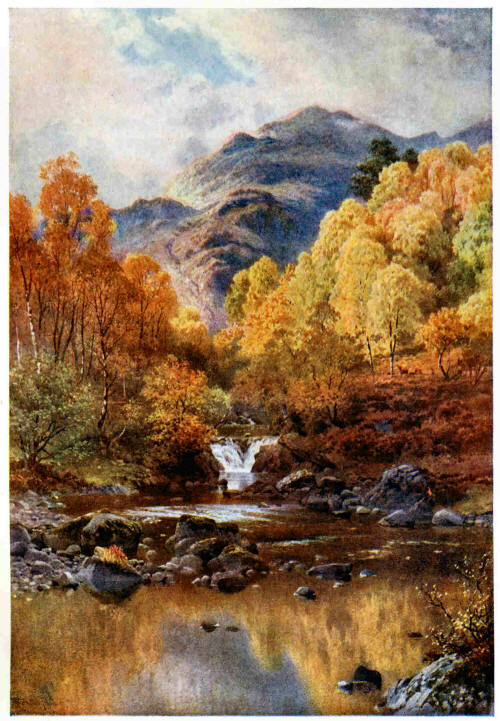
In the Heart of the Trossachs, Perthshire
men agree to recognise that as a poor vanity which
winks fondly at the halo consecrating its own faults, while blind to the
plainest merits of its neighbours. Excesses, defects, and compensations
must be everywhere recognised and allowed for, then at last we can take a
calm and exact account of human nature in its different manifestations
regarded by the light of impartial candour. And when in such a judicious
spirit we come to survey mankind from China to Peru, there can surely be
little doubt as to the due place of Scots in the broken clan of McAdam.
The above edifying principles were earnestly enforced
upon me by a French savant with whom I once travelled in the Desert
of Sahara, who yet almost foamed at the mouth if one pointed the moral
with a Prussian helmet-spike. Hitherto, alas! international
characterisations have been coarse work, usually touched with a spice of
malice Every parish flatters itself by locating Gotham just over its
boundary, as any county may have some unkind reproach against its
neighbours, Wiltshire moon-rakers, Hampshire hogs, or what not; and
nations, too, bandy satirical epithets, like those of a certain poet—
France is the land of sober common-sense,
And Spain of intellectual eminence.
In Russia there are no such things as chains;
Supreme at Rome enlightened reason reigns.
Unbounded liberty is Austria's boast,
And iron Prussia is as free—almost.
America, that stationary clime,
Boasts of tradition and the olden time.
England, the versatile and gay,
Rejoices in theatrical display.
The sons of Scotia are impulsive, rash,
Infirm of purpose, prodigal of cash.
But Paddy------
But, indeed, the rest is too scandalous for publication.
The most marked feature of the Scottish national
character is perhaps an engaging modesty that forbids me to dwell on the
achievements of a small country's thin population, who have written so
many names so widely over the world. But it must be admitted how the King
of Great Britain sits on his throne in virtue of the Scottish blood that
exalted a "wee bit German lairdie." Our men of light and leading are
naturally Scotsmen, the leaders of both parties in the House of Commons,
for instance. Since Disraeli—himself sprung from the Chosen People of the
old Dispensation—Lord Salisbury was our only Premier not a Scotsman. Both
the present Archbishops of the Anglican Church come from Presbyterian
Scotland. The heads of other professions in England usually are or ought
to be Scotsmen. The United States Constitution seems to require an
amendment permitting the President to be a born Scot; but such names as
Adams, Polk, Scott, Grant, McClellan, and McKinley have their significance
in the history of that country, while in Canada, of course, Mac has come
to mean much what Pharaoh did in Egypt. It is believed that no Scotsman
has as yet been Pope; but there appears a sad falling away in the Catholic
Church since its earliest Fathers were well known as sound Presbyterians.
The first man mentioned in the Bible was certainly a Scot, though English
jealousy seeks to disguise him as James I. Your "beggarly Scot" has the
Apostles as accomplices in what Englishmen look on as his worst sin, a
vice of
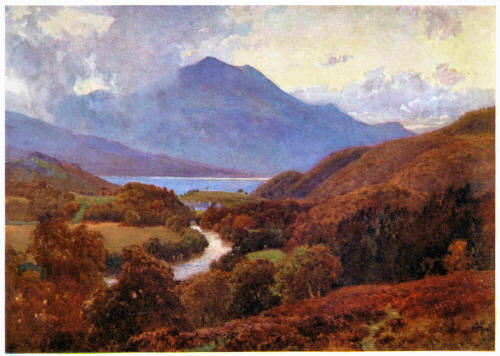
Brig O' Turk and Ben Venue, Perthshire
poverty which, in the fulness of time, he begins to
live down. Both Major and Minor Prophets deal with their Ahabs and
Jezebels much in the tone of John Knox. A legend, not lightly to be
despised, makes our ancestress Scota, Pharaoh's daughter; but I do not
insist on a possible descent from the lost Tribes of Israel. Noah is
recorded as the first Covenanter. Cain and Abel appear to have started the
feud of Highlander and Lowlander. Father Adam is certainly understood to
have worn the kilt. The Royal Scots claim to have furnished the guard over
the Garden of Eden, in which case unpleasing questions are suggested as to
the duties of the Black Watch at that epoch. The name of Eden was at one
time held to fix the site of Paradise in the East Neuk of Fife; but the
higher criticism inclines to Glasgow Green. In the south of Lanark,
indeed, are four streams that have yielded gold; but they compass a
country more abounding in lead, and the climate seems not congenial to
fruit trees. "I confess, my brethren," said the controversial divine,
"that there is a difficulty here ; but let us look it boldly in the face,
and pass on."
The antiquities of Stirling contrast with the modern
trimness of its neighbour, the Bridge of Allan, lying at the foot of the
Ochils two or three miles off, a Leamington to the Scottish Warwick, the
tramway between them passing the hill on which, to humble southron
tourists, Professor Blackie and other ardent patriots reared that tall
Wallace Monument whose interior makes a Walhalla of memorials to eminent
Scotsmen like Carlyle and Gladstone. Bridge of Allan is a place of mills
and bleach works, and of resort for its Spa of saline water, recommended,
too, by its repute for a mild spring climate, rare in the north. The
"Bridge," which we have so often in Scottish place-names, points to a time
when bridges were not matters of course; as in the Highlands we shall find
"Boats" recording a more backward stage of ferries. This bridge spans the
wooded "banks of Allan Water," up which a pleasant path leads one to
Dunblane, with the Ochil moorlands for its background.
Dunblane is notable for one of the few Gothic
cathedrals still used in Scotland as a parish church. Sympathetically
restored, it has even become the scene of forms of worship which
scandalised true-blue Presbyterians, while on the other hand I once came
across an Anglican lady much shocked to find how "actually there was a
Presbyterian service going on!" Carved screen, stalls, and communion table
make ornaments seldom seen in the bareness of a northern kirk, this one
admirable in its proportions and mouldings, if without the elaborate
decoration of Melrose. It has a valuable legacy in the library of a divine
well known in both countries, the tolerant Archbishop Leighton.
Among Scotsmen, Dunblane enjoys a modest repute as a
place of villeggiatura; to tourists it is perhaps best known as
junction of the Caledonian line to Oban, which brings them to Callander, a
few miles from the Trossachs. This line at first follows the course of the
Teith, "daughter of three mighty lakes," past Doune Castle, not Burns's
"Bonnie Doon," but an imposing monument of feudal struggles and crimes,
that has housed many a royal guest, if not, as one of its parish ministers
gravely declares for unquestionable, Fitz-James himself on the night
before his adventurous chase. So late as 1745,
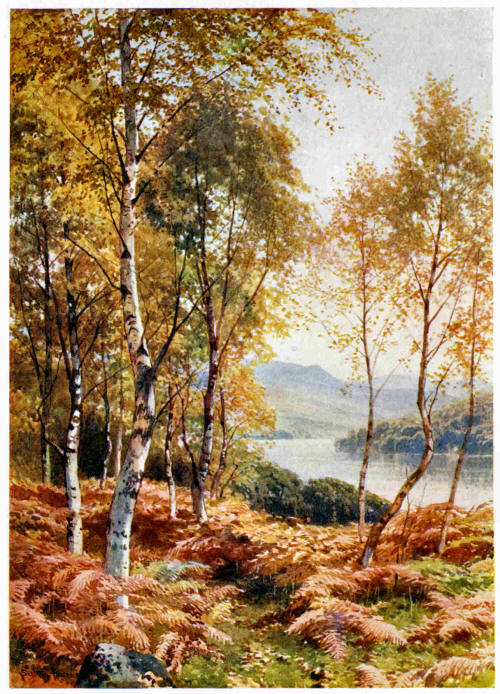
Birches by Loch Achray, Perthshire
Home, the author of Douglas, had an adventure
here, confined as prisoner of war in a Jacobite dungeon, from which he
escaped, with five fellow-captives, in quite romantic style ; and this, we
know, was one of the stages of Captain Edward Waverley's journey. Farther
up the river, another place of note is Cambusmore, where Scott spent the
youthful holidays that made him familiar with the Trossachs country.
Callander he does not mention, its name not fitting into his metre,
whereas its neighbour Dunblane's amenity to rhyme brought to be planted
there a flower of song at the hands of a writer who perhaps knew it only
by name. But Callander has grown into a snug little town of hotels and
lodging-houses below most lovely scenery, little spoiled by the chain of
lakes above being harnessed as water-works for thirsty Glasgow, whose
Bailie Nicol Jarvies now lord it over the country of Rob Roy and Roderick
Dhu.
Another way to the Trossachs is by "the varied realms
of fair Menteith," through which a railway joins the banks of the Forth
and the Clyde. The name of Menteith has an ugly association to Scottish
ears through Sir John Menteith, a son of its earl, who betrayed Wallace to
the English; the signal for these Philistines' onrush was given by his
turning a loaf upside down, and so to handle bread was long an insult to
any man of the execrated name. Sir John afterwards fought under Bruce; but
however Scottish nobles might change sides in the game of feudal
allegiance, the Commons were always true to patriotic resentment; and no
services of that house have quite wiped out the memory of a traitor
remembered as Gan among the peers of Charlemagne or Simon Girty on the
backwoods frontier of America. And fortune seems to have concurred in the
popular verdict, for till even the shadow of it died out in a wandering
beggar, little luck went with the title of Menteith, least of all in a
claim to legitimate heirship of the Crown; then this earldom seemed doubly
cursed when transferred to the Grahams, one of whom was ringleader in the
murder of James I.
Menteith, one of the chief provinces of old Scotland,
has shrunk to the name of a district described in a witty booklet by a son
of the soil, far travelled in other lands. [Notes on the District of
Menteith, by R. B. Cunninghame Graham.]
"A kind of sea of moss and heath, a bristly country (Trossachs is said to
mean the bristled land) shut in by hills on every side," in which " nearly
every hill and strath has had its battles between the Grahams and the
Macgregors"; but now "over the Fingalian path, where once the red-shank
trotted on his Highland garron, the bicyclist, the incarnation of the age,
looks to a sign-post and sees This hill is dangerous." Its stony fields
and lochans lying between hummocks are horizoned by grand mountains, among
which Ben Lomond, to the west, is the dominating feature, "in winter, a
vast white sugar-loaf; in summer, a prismatic cone of yellow and amethyst
and opal lights; in spring, a grey, gloomy, stony pile of rocks; in
autumn, a weather indicator; for when the mist curls down its sides, and
hangs in heavy wreaths from its double summit 'it has to rain,' as the
Spaniards say.
Menteith became a resort before Callander, when, early
in the eighteenth century, we find Clerk of Penicuik taking
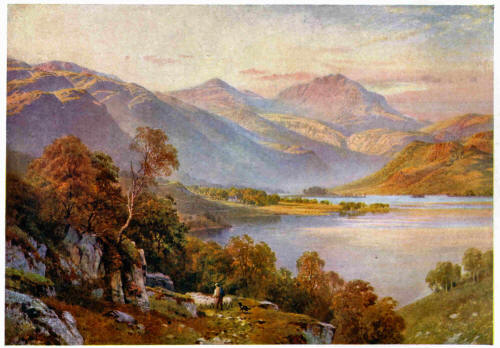
Head of Loch Lomond, Looking up Glen Falloch, Perthshire
his family there on a "goat's whey campaign," for which
remedy the Highland borders were often visited in his day. At an earlier
day, canny Lowlanders would be shy of trusting themselves, on business or
pleasure, beyond the Forth; and, even later, we know how Bailie Nicol
Jarvie thought twice before venturing into the haunts of that "honest"
kinsman of his. As Ben Lomond dominates this landscape, so looms out the
memory of Rob Roy Macgregor, that doughty outlaw who, like Robin Hood, has
taken such hold on popular imagination. Graham as he is, one suspects the
above-quoted representative of the old earls to have his heart with an
ancestral enemy who practised a kind of wild socialism—
To spoil the spoiler as he may,
And from the robber rend the prey.
It appears that Scott had Rob Roy in his eye as a
model for Roderick Dhu, and it is the Macgregor country which he has
given to his fictitious Vich Alpines. Mr. Cunninghame Graham points out
how the Highland borders were always more troubled than the interior
clandom, and how here especially the vicinity of a rich lowland offered
constant temptation for followers of the "good old rule, the simple plan"
recorded by Wordsworth. The Forth made a boundary against these predatory
excursions, yet sometimes a Roderick Dhu would harry fields and farms as
far as the home of "poor Blanche of Devon," beyond Stirling. The "red
soldiers" in turn came to pass the Highland line. On Ellen's Isle women
and children took refuge from Cromwell's men; Monk marched by
Aberfoyle, noting for destruction its woods that harboured rebels; and not
to speak of Captain Thornton's unlucky expedition, no less authentic a
hero than Wolfe once commanded the fortress which the Georges placed at
Inversnaid, near Rob Roy's home, to bridle that broken clan of Ishmaelites.
The railway, from Glasgow or from Stirling, passes to
the south of the Loch of Menteith, with its islands, to which a short
divagation might be made. Here, on the " Isle of Rest," shaded by giant
chestnuts which tradition brings from Rome, are the ruins of a cloister
whither the child Queen Mary was carried for refuge after the battle of
Pinkie, before setting out for France with her playmate maids of honour.
Last night the Queen had four Marys,
To-night she'll have but three;
There was Mary Beaton and Mary Seaton
And Mary Carmichael and me.
Mary Livingston was the authentic fourth of the
quartette in those days, and Mary Fleming held the place of Mary
Carmichael. The luckless heroine of this touching ballad was a Mary
Hamilton supposed by Scott to have been one of the Queen's attendants
later on, but her identity is somewhat dubious ; and one writer shows
reason to believe that the story of her crime and punishment has been
strangely shifted from the Russian Court of Peter the Great, where she
might well exclaim—
Ah! little did my minnie think,
The night she cradled me
The lands that I should travel in,
The death that I should dee!
Beyond this lake a railway branch brings us to

Golden Autumn, The Trossachs, Perthshire
Aberfoyle, on the banks of the "infant Forth," its
nursery name the Avon Dhu, "Blackwater," haunted like a child's dreams by
fairies of whom prudent Bailie Nicol Jarvie spoke under his breath, though
he professed to hold them as "deceits of Satan." Here the change-house of
Lucky M'Alpine has been replaced by an hotel offering all the comforts of
the Saltmarket, along with golf links and fishing at Loch Ard. As Ipswich
shows the very room in the White Hart occupied by Mr. Pickwick and the
green gate at which Sam Weller met Job Trotter, so among the lions here
are the ploughshare valiantly handled by Bailie Nicol Jarvie, nay, even
the identical bough from which he swung suspended by his coat tails. Such
relics let one guess why that worthy citizen would not give "the finest
sight in the Hielands for the first keek o' the Gorbals of Glasgow!" But
he might have taken another view had he seen the great slate quarries that
now scar the braes of Aberfoyle, or that pleasure-house on Loch Katrine
set apart for Glasgow magistrates to disport themselves at the source of
their city's water supply.
From Aberfoyle or from Callander, the rest of the
journey is by road to the Trossachs Hotel, which seems to represent
Fitz-James's imagination of "lordly tower" or "cloister grey"; then on
through the mile of bristling pass to the foot of Loch Katrine. How many a
peaceful stranger has passed this way since the Knight of Snowdoun's steed
here "stretched his stiff limbs to rise no more"! What "cost thy life, my
gallant grey" would be the fact that even in the poet's day, the path to
Ellen's Isle was more like a ladder than a road. Now the danger most to be
feared is from Sassenach cycling, which caused a coach accident in the
vicinity a few years ago. Umbrellas had replaced claymores so far back as
Wordsworth's time ; and waterproofs are the armour most displayed, where
once
Refluent through the pass of fear
The battle's tide was pour'd;
Vanish'd the Saxon's struggling spear,
Vanish'd the mountain-sword.
As Bracklinn's chasm, so black and steep,
Receives her roaring linn,
As the dark caverns of the deep
Suck the wild whirlpool in,
So did the deep and darksome pass
Devour the battle's mingled mass:
None linger now upon the plain,
Save those who ne'er shall fight again.
Macaulay, in his slap-dash style, has explained the
want of taste for the picturesque in a bailie or such like of more
romantic times. "He is not likely to be thrown into ecstasies by the
abruptness of a precipice from which he is in imminent danger of falling
two thousand feet perpendicular; by the boiling waves of a torrent which
suddenly whirls away his baggage and forces him to run for his life; by
the gloomy grandeur of a pass where he finds a corpse which marauders have
just stripped and mangled; or by the screams of those eagles whose next
meal may probably be on his own eyes." But Dr. Hume Brown {Early
Travellers in Scotland) shows how there were bold and not
unappreciative tourists in the Highlands before the era of return tickets.
Whatever the guidebooks say, it is certainly not the case that the
Trossachs were discovered by Scott. In Dr. T. Garnett's Tour through
the Highlands, published 1800, he relates a visit
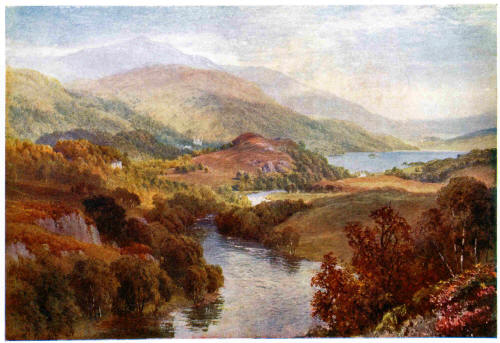
The River Teith, with Lochs Achray and Vennachar, Perthshire
to the "Drosacks," and speaks of the place as sought
out by foreigners. Several years before the publication of the Lady of
the Lake, Wordsworth, with Coleridge and his sister, on a Scottish
tour, turned aside to this beauty-spot, which they duly admired in spite
of the rain ; and there they met a drawing-master from Edinburgh on the
same picturesque-hunting errand. Dorothy Wordsworth's Journal tells
us how the cottars were amused to hear of their secluded home being known
in England; how two huts had been erected by Lady Perth for the
accommodation of visitors; and how a dozen years before the minister of
Callander had published an account of the Trossachs as a scene "that
beggars all description."
The bad weather proved too much for Coleridge, who
turned back from the tour here; and his muse seems not to have been
inspired by this land of the mountain which he found also a land of the
flood. Wordsworth, however, made several attempts to annex Scotland to his
native domain. Truth to tell, the lake poet's harp sounds sometimes out of
tune across the Border, as witness his woeful travesty of the "Helen of
Kirkconnel" story, and the philosophic considerations which he attributes
to Rob Roy over what may have been that bold outlaw's grave. There is one
verse in his "Highland Reaper" which seems a perfect epitome of the future
Laureate's qualities, who, if he "uttered nothing base," could come too
near being commonplace. "Will no one tell me what she sings?" is
surely in the flat tone which one irreverent critic describes as a
"bleat." "Perhaps the plaintive numbers flow"—is not this the false
gallop of eighteenth-century verse, out of which Wordsworth vainly
believed that he had broken his Pegasus? But in such pinchbeck setting,
what a pearl of price—
For old, unhappy, far-off things,
And battles long ago!
Thus to him, too, "Caledonia stern and wild" could
breathe her secret, while to put life into the raids and combats of long
ago was for another bard who plays drum and trumpet in the orchestra of
British poetry. I am not going to string vain epithets on the Trossachs,
familiar to all readers if only from the pages of their great advertiser.
But let me hint to tourists who come duly furnished with the Lady of
the Lake, that Black's Guide to the Trossachs includes an
excellent commentary on the poem from what may seem an unpoetical source,
the pen of an Astronomer-Royal, Sir G. B. Airey, whose topographical
analysis will be found most instructive. These scenes appear somewhat
trimmed since an old writer described the Highlands "as a part of the
creation left undrest." The lake edges have been smoothed off, as
the "unfathomable glades " of the Trossachs are opened up by a road, below
the line of the old pass and the hill tracks by which the Fiery Cross was
sped towards Strath-Ire.
For an account of this country as it is in our day, we
may refer to a French story by a writer named, of all names, Andre Laurie,
whose native heath ought to be the bonny braes of Maxwelton. This book has
the serious purpose of giving a view of English school athletics, and
pointing the moral that Frenchmen so trained would be all the fitter for
la revanche. The hero, sent to school in England, is, as part of
his educational course, taken by the schoolmaster on a shooting excursion
in the Highlands.
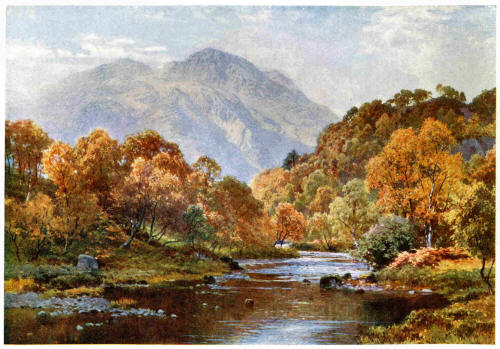
Veiled Sunshine, The Trossachs, Perthshire
They put up at the White Heart, one of the
principal hotels of Glascow, and the landlord is so interested in
their bold enterprise that he personally conducts them on the chasse
aux grouses. Nay more, he equips them with a pack of piebald pointers,
well trained to retrieve in water, which he had come by in a remarkable
manner: a certain Lord Stilton, breakfasting at the hotel, with true
British generosity made his host a present of these matchless hounds by
way of largesse for an excellent dish of trout—a rare treat, it
seems, in this part of the world.
The first day's proceedings of the sporting troop are
most notable. They "leave the civilised country" at Renfrew. How they get
across the Clyde does not appear ; but there are no doubt stepping-stones
in all Highland streams. Having thus invaded the Lennox, they forthwith
stalk its desolate moors from Loch Lomond to Loch Katrine, where as a
touch of local colour the author is careful to point out that one must not
use the word lakes. Nine or ten strong, the company is thrown out in
skirmishing order, those who have guns marching in front behind the dogs,
while the unarmed members are invited to bring up the rear "as simple
spectators." Scotland being such a proverbially hospitable country, they
do not judge it necessary to provide themselves with leave or license, but
their hotel-keeper for two or three shillings hires a bare-legged shepherd
in "a short petticoat" to show them where the game lies. In spite of this
liberality, towards the end of the day the bag amounts only to three or
four head, including one hare, explained to be a rara avis
hereabouts, and one fierce bull which has given a spice of danger to their
sport. In the evening, however, the grouse begin to "rise," spring up
"every instant under their feet," and nearly two dozen are brought down,
enough to serve for supper. The question of lodging presents more
difficulty, the Trossachs being an "absolutely desert" country without a
village for six leagues round; but the whole party are comfortably
accommodated in a fisherman's hut, fifteen to twenty feet square, which
must have been a tight fit for ten, even though there was no furniture
beyond a table, two benches and a sheepskin. With genuine Scottish pride
the fisherman refuses to accept a bawbee from his guests; though rather
too much given to "bird's eye tobacco" and "that abominable product of
civilisation Scotch whisky," he is a superior person, by his parents
designed for the national church, but the honour of "wearing a surplice,"
it is explained, had not seemed to him worth the frequent birching which
makes the discipline of parish schools in the north.
Next day, for a change, the strangers give themselves
up to the kindred sport of angling ; and two of them undertake the Alpine
ascent of one of the peaks above Loch Katrine, but, without a guide, come
to sore grief, and have to be rescued by a search party led by those
sagacious pointers in true Ben St. Bernard style. In such cases, our
author points out "the superiority of the savage over the civilised man,
at least in the desert." Only to the Highland fisherman had it occurred
that those luckless adventurers might want something to eat; but he,
taught by experience, produces in the nick of time a bottle of whisky, a
biscuit and a slice of bacon; and thus
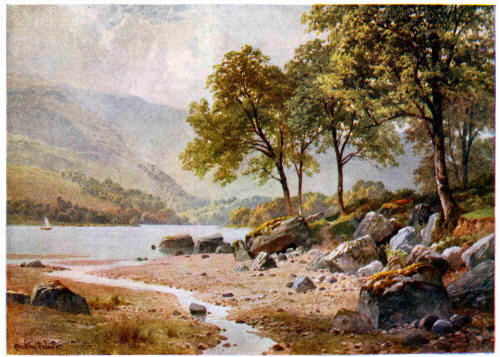
Near Ardlui, Loch Lomond, Dumbartonshire
the perishing hero's life is saved to "dance a Scottish
gigue"—O M. Laurie, M. Laurie, O!
The dancing comes through a luxurious experience of
Highland high-life, when this band of youths fall in with an old
schoolfellow, a Scottish nobleman who bears what seems the exotic title of
Lord Camember, but his family name is that well-known aristocratic one of
Orton. He welcomes them to his castle, where his coming of age is being
celebrated by crowds strangely enormous for such a "desert country," who
are entertained under tents "vast as cathedrals," with splendid
hospitality open to all comers, fountains flowing with beer, speeches,
music, dancing, and fireworks. As bouquet of the festivities, he
invites the strangers to a review of his stags, driven together "in full
trot" till their gigantic antlers "gave the illusion of the marching
forest in the Macbeth legend." The drive past lasts more than an hour, in
the course of which are enumerated 5947 horns, so that, allowing for
absentees, the young lord estimates a round number of seven thousand as
the stock of his deer forest. There could have been no such head of game
in the district when Fitz-James galloped all the way from the Earn to Loch
Katrine after one stag, losing it as well as his way. One can't help
feeling that our author's excursion through the scenes of his story must
have been an equally rapid one.
The Trossachs pass leads us to that lake that gets a
fair-seeming name not from any saint, but from the Highland Caterans
who once infested its banks; and it is hinted that "Ellen's Isle" may
have come to be christened through Scott's mistaking the Gaelic word
Eilean (island). There was, indeed, a certain Helen Stuart who played
a grimly fierce part in defending this place of refuge, as related in the
poem, but her exploit was performed against Cromwell's soldiers. In sight
of the "Silver Strand," tourists are wont to take steamboat as far as
Stronachlachar, and there cross by coach to the "bonny, bonny banks of
Loch Lomond." They whose "free course" moves not by "such fixed cause,"
might well hold on to the head of Loch Katrine, crossing to Loch Lomond
over the wild heights of Glengyle; or they would not find it amiss to turn
back to Aberfoyle, thence past Loch Ard and the Falls of Ledard, following
the track round Ben Lomond on which Rob Roy led Osbaldistone and the
Bailie out of his country. But one knows not how to direct strangers to
that wild region vaguely outlined by the above-mentioned French author,
where our generation may shoot grouse and bulls as they go, and find
quarters in any convenient hut or castle, when the Trossachs hotel happens
to have "not a bed for love or money." His story, one fears, must be
counted with the mediaeval wonders of Loch Lomond, fish without fins,
waves without wind, and such a floating island as still emerges after hot
summers in Derwentwater.
Dorothy Wordsworth, for one, rather belittles Loch
Katrine as an "Ulswater dismantled of its grandeur and cropped of its
lesser beauties," though she compliments the upper part as "very pleasing,
resembling Thirlmere below Armboth." But no critic can carp at the fame of
Loch Lomond as the most beautiful lake in Scotland; and one author who, as
a native of the Lennox, is not indeed unprejudiced, Smollett to wit, gives
it the palm over all the lakes he has seen in Italy or Switzerland. Dr.
Chalmers wondered if there would not be a Loch Lomond in heaven.
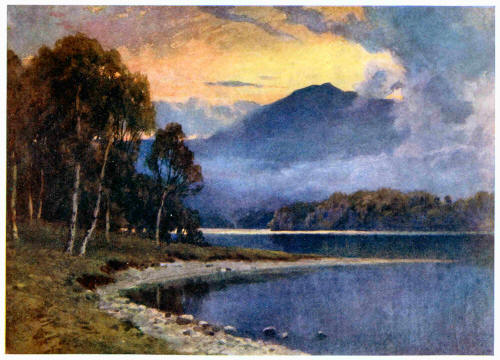
The Silver Strand, Loch Katrine, Perthshire
"A little Mediterranean" is the style given by a
seventeenth-century English tourist, Franck, to what Scott boldly
pronounces "one of the most surprising, beautiful, and sublime spectacles
in nature," its narrow upper fiord "lost among dusky and retreating
mountains," at the foot opening into an archipelago of wooded islands,
threaded by steamboats, while up the western shore runs one of the best
cycling roads in the kingdom, past memorials of Stuarts and Buchanans,
Colquhouns and wild Macfarlanes. On the other side are caves associated
with the adventures of Rob Roy, and spots sung by Wordsworth. And all this
wonderland is overshadowed by Ben Lomond, its ascent easily made on foot
or pony-back by a traveller not bound to do this whole round in one day.
But let him beware of getting lost in the mist and having to spend all
night on the mountain, as was the lot of that New England Sibyl, Margaret
Fuller. Also he should not imitate a facetious friend of mine who left his
card in the cairn at the top, and two or three days later received it
enclosed in this note: "Mr. Ben Lomond presents his compliments to
Mr.------and begs to say that not only does his position prevent him from
returning visits, but he has no desire for Mr.------'s further
acquaintance."
At the foot of Loch Lomond we regain the rails that
will carry us to Edinburgh, to Glasgow, to Stirling, or to the western
Highlands. The first stage is down the Vale of Leven to Dumbarton, arx
inexpugnabilis of old Scotland, its name Dunbritton recording
the older days when it was the stronghold of a Cumbrian kingdom. Here the
literary genius loci is that not very ethereal shade Tobias
Smollett, who, born on the banks of Leven, has nothing to say of the
Trossachs, but looked back on the scene of Roderick Random's pranks as an
eighteenth-century Arcadia, that could move him to a rare strain of
sentiment in his "Ode to Leven Water."
Devolving from thy parent lake,
A charming maze thy waters make,
By bowers of birch, and groves of pine,
And hedges flower'd with eglantine.
Still on thy banks, so gaily green,
May numerous herds and flocks be seen,
And lasses chanting o'er the pail,
And shepherds piping in the dale,
And ancient faith that knows no guile,
And industry embrown'd with toil,
And hearts resolved, and hands prepared,
The blessings they enjoy to guard.
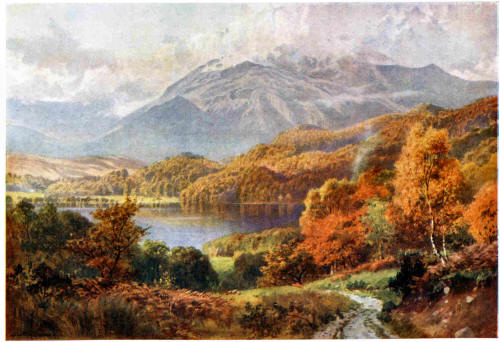
Loch Achray and Ben Venue, Perthshire |

